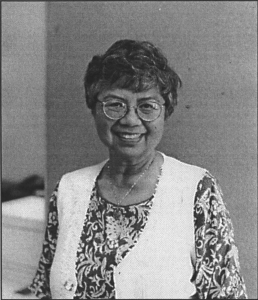Catherine Diama Campainha

Tsunamis Remembered: Oral Histories of Survivors and Observers in Hawai‘i
Life history interviews with individuals who witnessed and survived tsunamis-particularly the 1946 and 1960 disasters on the Big Island of Hawai'i. Thirty individuals-mostly residents of Hilo and Laupahoehoe-recall their experiences before; during, and after the 1946 and 1960 tsunamis which were arguably the most destructive natural disasters in modem Hawaiian history.
Catherine Diama Campainha was born to Visayan immigrants, Catalina Buscas Diama and Agapito Diama, in Hilo, Hawai'i on March 28, 1938. She has five brothers and four sisters. Her father owned and operated Mamo Pool Hall, a billiard parlor located below their living quarters, and rented out rooms to bachelors in a boardinghouse. Her mother leased and ran the Ideal Meat Market until the mid-1940s. The Diama home on Mamo Street was a gathering place. The streets in the area served as a playground for the Diama children and their neighbors. She attended English-standard Riverside School and graduated from Hilo High School in 1956. In 1960 she earned a bachelor's degree in speech correction from the University of Hawai'i at Manoa. A year later, she received her teaching certificate. Her career in education began in 1961 at O'ahu's Kahuku High School. She later taught at Waiakea Intermediate School and Waiakea High School. She also taught for a year in Seattle, Washington. Campainha retired in 1993. Her father's Mamo Street pool hall sustained some damage but survived the 1946 tsunami. However, the business was destroyed in the 1960 waves. Her father eventually established a new pool hall at Papa'ikou, and later, on Ponahawai Street in Hilo. Catherine Campainha and her husband, Alwin, have one son, Ray. The couple resides in Hilo.
Scope and Content Note
A retired teacher tells of her mother's immigration from the Philippines, family's businesses (billiard parlor, meat market, and boardinghouse), childhood activities in her Mamo Street neighborhood, and education at Riverside School, an English-standard school. Her account of the 1946 tsunami, which damaged the billiard parlor, is told from a child's perspective.
Program Note:
This interview is part of the Center for Oral History's project Tsunamis Remembered: Oral Histories of Survivors and Observers in Hawai‘i. Interviews from this project are available in the Center's ScholarSpace open access repository.
The Center for Oral History (COH), in the Department of Ethnic Studies at the University of Hawaiʻi at Mānoa, collects, documents, preserves and highlights the recollections of Native Hawaiians and the multi-ethnic people of Hawaiʻi. It produces oral histories and interpretive historical materials about lifeways, key historic events, social movements and Hawaiʻi’s role in the globalizing world, for the widest possible use.
Please Note: The oral histories in this collection are protected by copyright and have been created for educational, research and personal use as described by the Fair Use Doctrine in the U.S. Copyright law. Please reach out Voices@noaa.gov to let us know how these interviews are being used in your research, project, exhibit, etc. The Voices staff can help provide other useful resources related to your inquiry.
The NOAA mission is to understand and predict changes in climate, weather, oceans, and coasts, to share that knowledge and information with others, and to conserve and manage coastal and marine ecosystems and resources. The Voices Oral History Archives offers public access to a wide range of accounts, including historical materials that are products of their particular times, and may contain offensive language or negative stereotypes.
Voices Oral History Archives does not verify the accuracy of materials submitted to us. The opinions expressed in the interviews are those of the interviewee only. The interviews here have been made available to the public only after the interviewer has confirmed that they have obtained consent.
